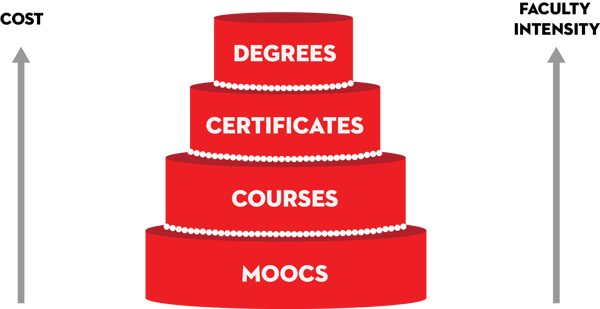Institutional Strategies for MOOCs: Berklee’s Approach

Berklee College of Music was founded on the revolutionary principle that the best way to prepare students for careers in music is through the study and practice of contemporary music. For 70 years, the college has evolved to reflect the state of the art of music and the music business, leading the way with the world’s first baccalaureate studies in jazz, rock, electric guitar, film scoring, songwriting, turntables, electronic production, and more than a dozen other genres and fields of study.
Berklee Online, the online continuing education division of Berklee, has been teaching music online for 13 years. Building on Berklee’s rich tradition of distance education—including mail-based correspondence courses in the 1960s and 70s that brought the likes of Alf Clausen, Gary Burton and David Mash to the college—Berklee Online was established in 2001. Our mission is to expand the reach of the college and provide music education opportunities to a global base of aspiring musicians. Over the years, we’ve developed a diverse portfolio of online offerings, from free to degree, all representing contemporary music and music-related studies.
Berklee President Roger H. Brown describes Berklee Online’s portfolio as a “Wedding Cake” of options for students. As you move up through the layers, the costs increase as does a student’s access to Berklee curricula and faculty in small, intimately sized cohorts.
In 2012, after teaching more than 75,000 students online, we became a partner institution with both Coursera and edX. This added a new bottom layer to our wedding cake of options: MOOCs.
Berklee’s Institutional Strategies with MOOCs
Many institutions entered the world of MOOCs as a way to begin offering courses online. Berklee’s reasons were different: MOOCs aligned with our mission and would enable us to address a number of strategic initiatives for the college including:
- Raise visibility for Berklee
- Provide readiness courses for prospective students
- Provide music education opportunities to international and underserved populations
- Provide a pathway of study with Berklee Online
- Leverage and maximize industry partnerships
Raise Visibility for Berklee
The expansive reach of Coursera and edX has provided increased visibility for the Berklee brand. In 12 years, we’ve taught 75,000 students via Berklee Online. In just two years, our MOOCs have reached 1.4 million people worldwide.
Provide Readiness Courses for Prospective Students
Prospective Berklee students now have a tool to help them better prepare for their audition to Berklee. We developed the MOOC, Developing Your Musicianship, which provides instruction in basic harmony and ear training, and serves as a preparatory tool for students interested in studying at Berklee. In addition to the learning content, the course features interviews with, and performances by, Berklee students. The authors for the course represent a cross section of chairs and faculty from the college’s Harmony, Ear Training, and Contemporary Writing & Production departments.
Provide Music Education Opportunities to International and Underserved Populations
Through a generous grant from the IDB, we will create Berklee’s Developing Your Musicianship MOOC in Spanish and also in Portuguese, to serve populations for whom our English language version of the course is inaccessible. We are also embarking on a Mandarin language version of our Musicianship Specialization via Coursera that will include four courses fully translated.
Provide a Pathway of Study with Berklee Online
Berklee Online has an expansive reach. This year we will teach 11,000 students in our online courses, certificate programs, and online degree programs, and close to 1m via MOOCs. If you imagine a flipped Berklee Online wedding cake, it looks and serves very much like a traditional marketing funnel, where students move from their entry point down through our various offerings over time.
Each of the nine MOOCs we have created so far provide the readiness skills needed for our entry-level paid offerings. For example the “Introduction to Ableton Live” MOOC on Coursera prepares students for Berklee Online’s “Producing Music with Ableton Live” course and related programs, in the same way that the “Introduction to Guitar” MOOC on Coursera provides the readiness skills needed for Berklee Online’s “Guitar Chords 101” and a program of study in guitar.
In just over two years, 300,000 of our MOOC students have become registered members of Berklee Online. Many of these students have gone on to engage with us more deeply by enrolling in our college-level online courses, certificate programs, and even apply to the online bachelor’s degree program. Indeed, in 2015 we welcomed 45 students into our certificate programs and eight students into our online degree programs who originally found us via Berklee’s MOOCs.
One of our online Bachelor of Professional Studies students provides the perfect case study for a MOOC student matriculating into a for-credit program. James Mina found Berklee Online through a MOOC offered on Coursera in 2013. He went on to download marketing collateral and making other touch points with Berklee Online throughout the year. In February 2014, a year after registering for his first MOOC, he began the degree application process and matriculated into a degree program in January 2015.
“By the time I realized that I wanted a career in music, I thought it was too late to amass the resources necessary to attend a premier university,” he said. “My first MOOCs with Berklee Online shattered my old phobias and inspired me to start crafting a portfolio that could give me a fighting chance at getting accepted to Berklee”
Leverage and Maximize Industry Partnerships
Berklee maintains strong relationships with all segments of the music industry, and MOOCs have provided a new way to leverage and maximize those relationships. We’re working with a number of companies to create MOOCs that teach Berklee music production curricula where students demonstrate understanding and apply the educational concepts they learn to a given music production application. For example, Ableton, a German-based music production hardware and software company has a music production software program called “Live.” Ableton offers a free version of Live, so we created the “Introduction to Ableton Live” MOOC. The author of the course, Erin Barra, is a Berklee songwriting faculty member as well as an Ableton-endorsed artist. Ableton helped with the marketing and promotion of the MOOC, raising awareness and boosting enrollments. This partnership was a positive one for Berklee, Ableton, and our students. We are pursuing more opportunities like this with music industry partners that offer de facto standard applications with a “free” version for our MOOC students.
Looking Ahead: MOOC Acceleration
Our foray into the world of MOOCs has been nothing short of positive. In addition to addressing the strategic initiatives listed above, our course development staff has enjoyed working in new online course development platforms, our administrative staff have benefited from being part of a close knit community of institutional partnerships, and the revenue generated through Signature Track and other paid options is serving to fund the development of additional MOOCs. We have made a decision to further our commitment to this initiative and hire two dedicated MOOC staff positions to accelerate this effort and grow our catalog of MOOCs.
In closing, I would encourage anyone considering adding MOOCs to their institution’s overall online strategy. In isolation, MOOCs serve a purpose, but offered in the context of a diversified portfolio of online offerings, they can be a powerful tool to expand the reach and raise institutional brand awareness.
Author Perspective: Administrator




